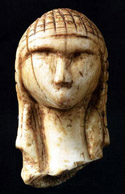Anthropology, Department of

Department of Anthropology: Faculty Publications
Document Type
Article
Date of this Version
3-13-2017
Citation
PNAS, vol. 114 no. 13, pp. E2590–E2597; Published online March 13, 2017.
doi/10.1073/pnas.1618655114
Abstract
Marriage in many traditional societies often concerns the institutionalized exchange of reproductive partners among groups of kin. Such exchanges most often involve cross-cousins—marriage with the child of a parent’s opposite-sex sibling—but it is unclear who benefits from these exchanges. Here we analyze the fitness consequences of marrying relatives among the Yanomamo¨ from the Amazon. When individuals marry close kin, we find that (i) both husbands and wives have slightly lower fertility; (ii) offspring suffer from inbreeding depression; (iii) parents have more grandchildren; and (iv) siblings, especially brothers, benefit when their opposite-sex siblings marry relatives but not when their same-sex siblings do. Therefore, individuals seem to benefit when their children or opposite-sex siblings marry relatives but suffer costs when they, their parents, or same-sex siblings do. These asymmetric fitness outcomes suggest conflicts between parents and offspring and among siblings over optimal mating strategies. Parental control of marriages is reinforced by cultural norms prescribing cross-cousin marriage. We posit that local mate competition combined with parental control over marriages may escalate conflict between same-sex siblings who compete over mates, while simultaneously forging alliances between opposite-sex siblings. If these relationships are carried forward to subsequent generations, they may drive bilateral cross-cousin marriage rules. This study provides insights into the evolutionary importance of how kinship and reciprocity underlie conflicts over who controls mate choice and the origins of cross-cousin marriage prescriptions.
Includes supplementary documents.
Supplementary dataset attached below,
Excel spreadsheet


Comments
Copyright 2017 National Academy of Sciences USA.